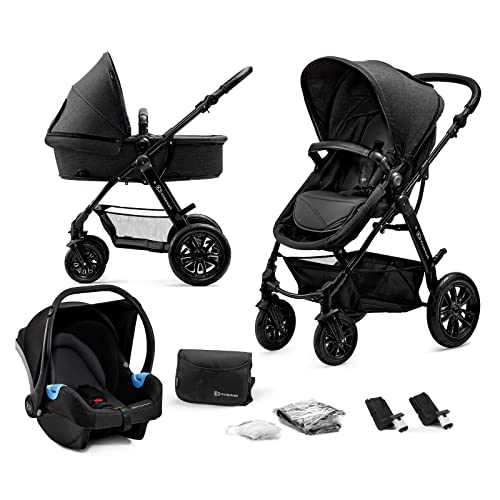What is a Pushchair
single pushchair with buggy board?
A pushchair
single pushchair is designed to carry a
single gb stroller child (although some can be used as early as birth with a car seat or carrycot). Some are lightweight and transform into double.
It features a contemporary, nippy design and features that make it a favourite with families, such as adjustable handlebars for height and a large basket. It has machine-washable fabric and an earmuff that is a must-have accessory in colder weather.
Convertible
Convertible strollers are a fantastic option for parents who want a stroller that will grow with their child. This type of stroller has a hammock seat that transforms into a carrycot, making it an ideal option for babies. It's also lightweight and easy to fold.
The Larktale Crossover is a wagon/stroller that easily converts to a double-seater with no need for any tools. It is equipped with many features that make it a great choice for parents, such as the large undercarriage as well as an organizer hanging from the push bar in both modes. There are a few drawbacks, like the confusion of the zipper that connects to the back of the seat 1 in wagon-mode, and the dimensions of the cup holders.
Brakes
A good
pushchair single will come with several brake systems. One of them is the hand brake, which is usually small levers on the front of the chassis that you flick down to stop and push off to start again. This is helpful in urban areas, where you may need to slow down quickly or on the pavements of shopping centres where pedestrians might be present. The other type of braking system is the front wheel brake system that is used on the top of the line pushchairs, such as the phil&teds dash and the Bugaboo Cameleon 3 which is activated by pushing the pedal the same way as the brake on bicycles. This is particularly useful when you're jogging or going through rough terrain as it stops the pushchair immediately and ensure that your child is safe.
The left coupling system 171 used for the rear leg 57 as well as the front leg 19 has a rear leg mounting bar 173 to which the rear leg 57 is permanently connected; a gear 175 fixed to a side surface 163 of the housing 33, which is positioned within hub 3 and a bushing 177 connected to the gear 175 and extended through a slot 179 provided at the end of the mounting bar 173; and a cable 183 designed to wrap around the J-shaped spool 181 and the post 31 of the front leg 19. The left coupling system 171 used for the rear leg 57 and the front leg 19 comprises a rear leg mounting bar 173 to which the rear leg 57 is fixedly coupled; a gear 175 positioned on a side surface 163 of the housing 33, which is positioned within hub 3; the spool component 181 and post 31 of the front leg 19 coiled around the J-shaped spool component 181 within a slot 179 located at the end of the mounting bar 173 and a coiled cable.
The brake system 215 includes an initial end 227 that is designed to connect with the brake cam when the braking cam is in the second position, and an additional end 229. The second end of brake lever 229 is equipped with a number of teeth 231. The teeth are designed to contact the teeth of a gear 233 which is driven by a stroller 1's first rear wheel 59. When the brake lever pressed, the braking cylinder prevents the rotation of the first rearwheel 59 of stroller 1. The braking system can be operated manually.
Seat unit/carrycot
A
single jogging stroller pushchair is a type of baby transporter for older babies (6 months +) who are starting to sit up and view the world. Often these have the option of converting into a pram. Prams are more modern and designed for babies to toddlers. They come with extra padding to make your child comfortable.
Many pushchairs work with car seats and allow you to make an entire travel set that allows you to transfer sleeping babies from your car into the pushchair. Some pushchairs come with an infant carrycot that is ideal for babies. Others have a seat unit that can be used to help your child get ready to leave the carrycot.
Most 'from birth' pushchairs offer the option of 'facing directions' for the seat unit/carrycot. either parent facing to help reassure and bond with baby or world facing so they can discover the world. Some pushchairs even have the option to attach a second carrycot or infant carrier, or ride-on for growing families.
A high-quality pushchair should be able move easily over various terrains, such as grass, pavements, and rough surfaces. A durable chassis and good tyres are important. Certain tyres are pneumatic, that require air to be added from time to time and some tyres are made from other materials like EVA or PU, which can give a more comfortable and stable ride.

Your pushchair will be one of the most frequently used baby items you own, so it's worth investing in a high-quality design that's easy to clean and maintain. A quick wipe down with a baby wipe should get rid of any spills or crumbs and more stubborn marks can be eradicated by aiming the hot air from your hair dryer at the area affected for 1 minute.



